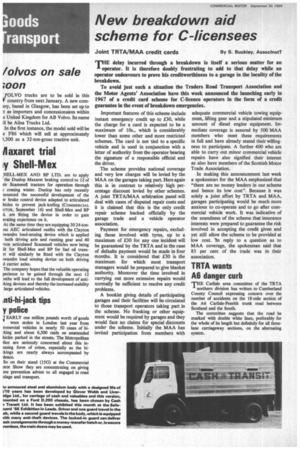New breakdown aid scheme for C-licensees
Page 50

If you've noticed an error in this article please click here to report it so we can fix it.
Joint TRTA/MAA credit cards By S. Buckley, AssocInstT THE delay incurred through a breakdown is itself a serious matter for an operator. It is therefore doubly frustrating to add to that delay while an operator endeavours to prove his creditworthiness to a garage in the locality of the breakdown.
To avoid just such a situation the Traders Road Transport Association and the Motor Agents' Association have this week announced the launching early in 1967 of a credit card scheme for C-licence operators in the form of a credit guarantee in the event of breakdown emergencies.
Important features of this scheme include instant emergency credit up to £30, while the charge for a card is expected to be a maximum of 10s., which is considerably lower than some other and more restricted schemes. The card is not tied to a specific vehicle and is used in conjunction with a letter of authority from the operator bearing the signature of a responsible official and the driver.
The scheme provides national coverage and very low charges will be levied by the MAA on the garages taking part. Here again this is in contrast to relatively high percentage discount levied by other schemes. A joint TRTA/MAA arbitration panel will deal with cases of disputed repair costs and it is claimed that this is the only credit repair scheme backed officially by the garage trade and a vehicle operator association.
Payment for emergency repairs, excluding those involved with tyres, up to a maximum of £30 for any one incident will be guaranteed by the TRTA and in the case of defaults payment would be made in four months. It is considered that £30 is the maximum for which most transport managers would be prepared to give blanket authority. Moreover the time involved in carrying out more extensive repairs would normally be sufficient to resolve any credit problems.
A booklet giving details of participating garages and their facilities will be circulated to those transport operators taking part in the scheme. No franking or other equipment would be required by garages and they would face no claims for special discounts under the scheme. Initially the MAA has invited participation from members with adequate commercial vehicle towing equipment, lifting gear and a stipulated minimum amount of diesel engine equipment. Immediate coverage is assured by 500 MAA members who meet these requirements in full and have already stated their willingness to participate. A further 400 who are able to carry out minor commercial vehicle repairs have also signified their interest as also have members of the Scottish Motor Trade Association.
In making this announcement last week a spokesman for the MAA emphasized that "there are no money lenders in our scheme and hence its low cost". Because it was solely a joint effort by TRTA and MAA, garages participating would be much more anxious to co-operate and to go after commercial vehicle work. It was indicative of the soundness of the scheme that insurance interests were prepared to guarantee the risk involved in accepting the credit given and yet still allow the scheme to be provided at low cost. In reply to a question as to MAA coverage, the spokesman said that 85 per cent of the trade was in their association.
















































































































































































































